How the Coos, Curry, and Douglas Counties Business Development Corporation’s award-winning Economic Recovery Initiative set up small businesses and nonprofits in Southern Oregon to thrive
Georgie Pulman-Olzaski was used to taking risks.
A former professional skydiver, Pulman-Olzaski began selling Hawaii Doggy Style — a line of Toblerone-style single-ingredient dog treats — while living with her husband in Hawaii in 2007. After having one too many close calls on the skydiving range, and noticing the growing toll the high-flying lifestyle was taking on her body, she decided it was time for a career change.
She had recently been given a Rottweiler puppy by a friend and says she had a difficult time finding dog treats she considered healthy, so a dog-treat business felt like a good fit.
The dog treats had done handy business in Hawaii, but in 2014, when Pulman-Olzaski moved to Roseburg to be close her husband’s family, she found it necessary to pivot. Her husband, Stanley, got a job working at Orenco Systems, the Sutherlin-based maker of septic systems, but Pulman-Olzaski’s business struggled. In Hawaii her treats had been a hit with tourists and locals alike; in Roseburg they were a harder sell.
“I couldn’t get a job and I couldn’t get my business up and running again. People were like, ‘Who the hell are you? You’re talking about Hawaii Doggy Style, and we don’t understand your product,’” says Pulman-Olzaski. “And I had stopped skydiving. I kind of lost my identity and my way forward. It was horrible. I went through a bit of depression, to be honest.”
To save her struggling business, Pulman-Olzaski went back to school at Umpqua Community College to purse an associate’s degree in business management and a certificate in management and entrepreneurship. There she met Kemberly Todd, the technical assistance coordinator with the Coos, Curry, and Douglas Counties Business Development Corporation, one of 19 economic-development districts in Oregon.
Todd helped Pulman-Olzaski rebrand and relaunch her business in 2019: Hawaii Doggy Style became K9 Crack. When the COVID-19 pandemic hit the following year, Todd helped her take her business online.
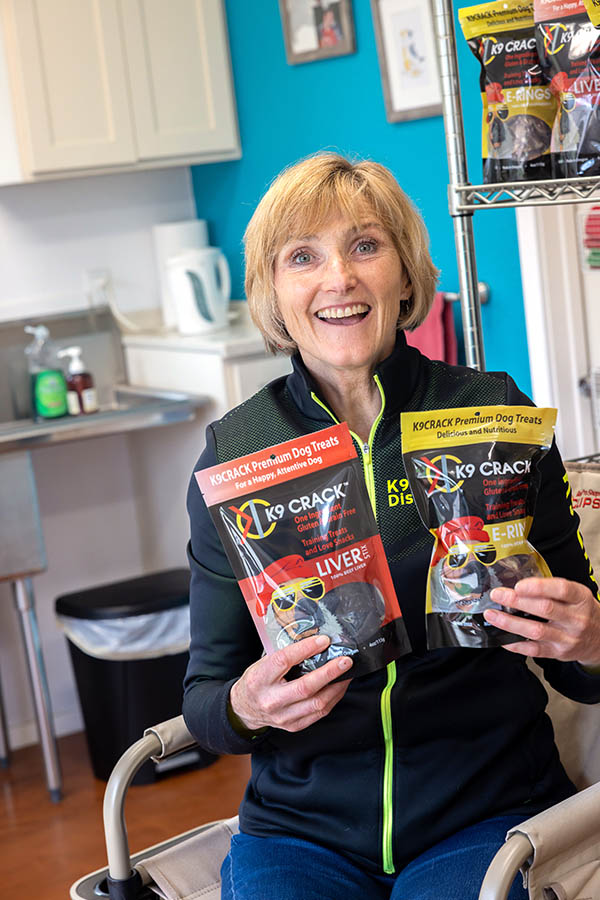
In 2021 Pulman-Olzaski and her dog-treat business became one of 186 businesses to take part in the CCD’s Economic Recovery Initiative, a technical assistance and grantmaking program developed in response to the pandemic and focused on regional economic recovery and long-term resilience.
The CCD’s Economic Recovery Initiative was a two-year project focused on the regional economic recovery in response to the COVID-19 pandemic, connecting local businesses and nonprofits with resources, and creating a long-term resiliency plan to strengthen the region when facing future disasters.
The ERI was funded by an EDA CARES Act Recovery Assistance planning grant. According to CCD’s internal data, the ERI program secured more than $1,150,000 in grant money, $700,000 in loans and $22,000 in professional services for its clients, supporting 533 jobs and providing over 4,000 hours of service from its six-person team.
The ERI has been recognized by multiple entities as an outstanding economic development project: In 2021 it received a Community Celebration Award for Coos County from the United Way of Southwestern Oregon as well as National Association of Development Organization’s (NADO) 2021 Aliceann Wohlbruck Impact Award. In October 2022, the CCD received the Award of Excellence in Economic Development for Outstanding Collaborative Partnership at the Oregon Economic Development Association (OEDA) conference for its application of the ERI program.
Pulman-Olzaski says that without the hands-on approach the CCD took with her business, she’s not sure where K9 Crack would be — a sentiment echoed by many participants in the program. From working with her through grant and loan applications to sitting down and rehearsing her business presentation with her to helping her increase her online presence, Pulman-Olzaski says the ERI program not only helped her business survive the pandemic but gave K9 Crack a leg up on the competition.
The CCD also helped K9 Crack increase its online presence by introducing Pulman-Olzaski to a web developer to improve her website and work on search engine optimization. The CCD paid for the initial work by the developer, which Pulman-Olzaski now does on her own whenever she has a problem.
“The people at CCD were brilliant. They were holding my hand to make sure when I sent my forms in, they wouldn’t be sent back, and pushing me to make sure I did it,” says Pulman-Olzaski. “They’ve really been good about making sure that I’ve had money to propel me forward through the pandemic, which has really set me up to expand now, which is what we’re ready to do.”
The ERI was conceived in September of 2020, when the development district received a 24-month EDA CARES Act Recovery Assistance planning grant to support economic recovery and resiliency in the face of massive unemployment and economic slowdown generated by the COVID-19 pandemic.
To start, CCD staff conducted Zoom interviews with 40 individuals it considered to be “stakeholders” — which CCD economic development director Lehi Dowell defined as municipality leaders, nonprofits and small-business owners. The CCD also sent a needs-assessment survey to 340 businesses in its jurisdiction to determine what the needs of the district really were, and how the CCD could best address the problems facing the business community.
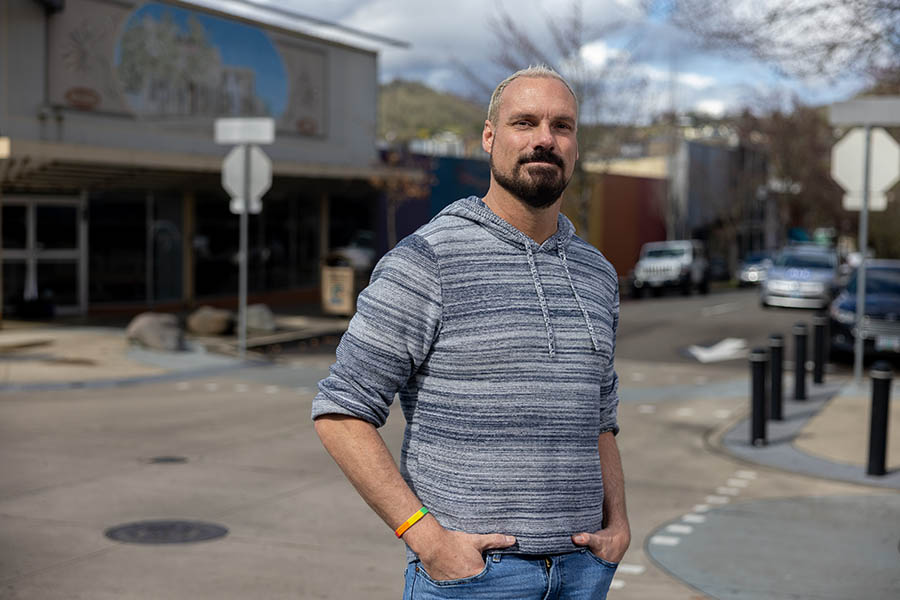
The program was spearheaded by Dowell, who joined the CCD in May of 2021 specifically to oversee the ERI. Dowell grew up in Sutherlin and is currently in his fourth year as a Ph.D. student in planning, governance, and globalization at the School of Public and International Affairs at Virginia Polytechnic Institute, after spending 10 years working in hospitality and another 10 years in nonprofit administration.
He says his rural and administrative background made the position an ideal fit.
“I do economic development and I have a specialization in rural America, because I grew up here, so this is right in my wheelhouse. I can shear a sheep, pluck a chicken and go write a $3 million FEMA grant.”
Dowell says the results were eye-opening and exposed persistent business needs in a way that went far beyond the damage done by COVID-19, showing a lack of connection to resources and support networks that amplified the damage caused by the pandemic.
Some surveyed business owners lacked a business plan to qualify for federal grants, while others lacked access to the internet. Dowell says some owners hadn’t done their taxes in several years due to lack of access to information and technology.
“I can shear a sheep, pluck a chicken and go write a $3 million FEMA grant.”
Lehi Dowell
“Those little things meant business owners couldn’t have access to funding, and we realized that was even more pronounced for marginalized folks. And when I say ‘marginalized’ in this region, I’m talking about rural Oregonians, because maybe people in Portland had access to scanners and reliable internet, but in rural America, we just didn’t.”
After reviewing the responses, the project identified three gaps the ERI needed to fulfill: access to communication networks, financial resource identification, and business acumen/technical assistance training.
In reviewing the responses, some of the biggest barriers to business and nonprofit resiliency in the face of disaster was lack of access to information about what was occurring and how to get help and support; inability to access online resources; and a lack of connectivity to state agencies and other businesses to share tips and success stories. The report found that business owners were receiving varying, often conflicting, messages about where to go and what to do in the face of the COVID-19 disaster. Dowell’s next step was partnering with Business Oregon to create an online space to connect business owners with nonprofits and government agencies able to help.
For Douglas County, this meant the creation of the Community Website Partnership, an online resource for business owners. For Coos and Curry counties, the CCD secured grant funding from Business Oregon to hire full-time staff to run the region’s own community website partnership, South Coast Oregon Connects, which had previously been run on a volunteer basis.
The interviews also found a persistent lack of access to broadband internet. The mission then became providing technical assistance to struggling business and nonprofit owners.
One such business owner was Jill Dillon, owner of Myrtle Trees Motel in Myrtle Point.
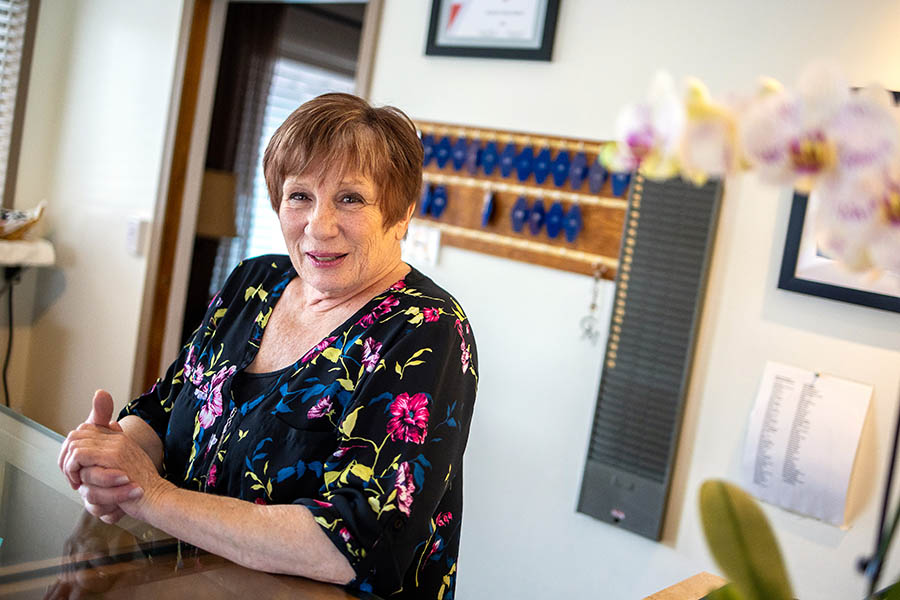
Dillon had operated the motel with her husband for 35 years until he passed away in 2019. She says the motel never had the need for an online booking system or online marketing. That all changed during the COVID-19 pandemic, when tourism fell to an all-time low, and having an online presence — and an online reservation system, as opposed to the motel’s old pen-and-paper system — was the only way to attract business. Dowell personally oversaw an analysis of Dillon’s motel business and helped her secure a technical assistance grant to create an online booking system.
“I was really fortunate they had someone who had motel/hotel experience,” Dillon says of Dowell. “Lehi came up in late fall of 2021, and they did a complete analysis of the motel in all the aspects of housekeeping, maintenance and all our financials. They looked at everything and literally walked us through how to do their recommendations because I had not a clue how to go about this.
“Ever since my husband passed, I had been looking for ways to make things easier on myself. Lehi was instrumental in getting this done. I’m so grateful; I could never repay him for what’s he’s done. This was a huge change for us,” Dillon says.
For Elena Lininger, executive director of veterans’ nonprofit Source One Serenity in Roseburg, the technical assistance program helped her expand her service to include environmental stewardship. She says Dowell helped qualify the nonprofit for even more grant money and opened up new opportunities for her nonprofit to serve the community.
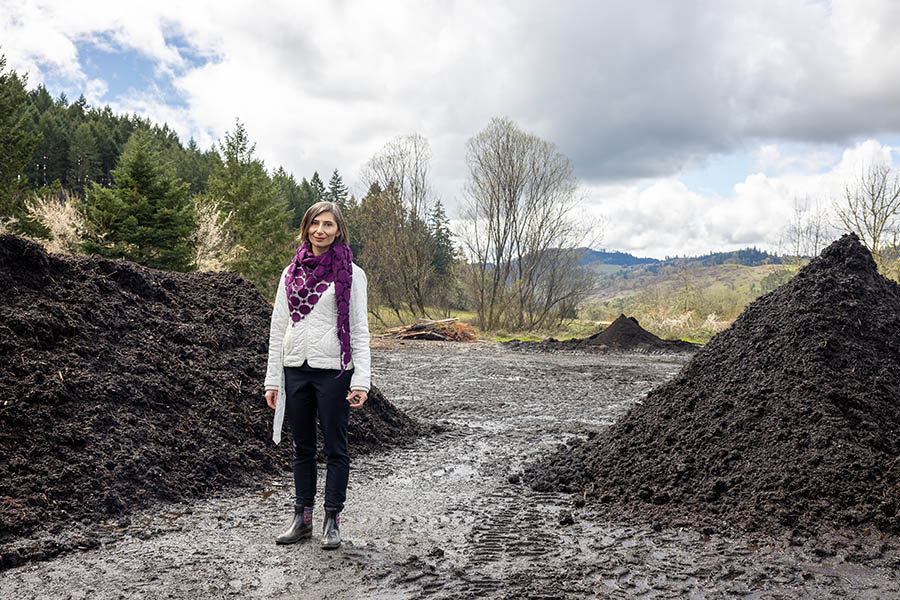
Lininger grew up in Germany and met her husband, an Army veteran who served two tours in Iraq, when he was working at an EU military base in outdoor recreation. When the couple moved back to her husband’s hometown of Roseburg in 2016, Lininger saw a need for a nonprofit to support the mental health and enrichment of the city’s high concentration of veterans. She says 13% of Roseburg residents are Army veterans — compared to just 8% of Oregon residents as a whole.
She began what would eventually become Source One Serenity as a hiking and fly-
fishing group, and launched her organization fully in 2021 with the help of the CCD. Most of her organization’s activities take place outdoors, so foraying into land stewardship and composting was a natural fit.
As part of the ERI program, Source One Serenity secured over $20,000 in grant money, including a composting and food-waste-reduction grant from the U.S. Department of Agriculture. She also began taking members on community service outings where members cleared brush from hiking trails, an effort she says has had a positive impact on tourism.
Since its official launch, Lininger says Source One Serenity has served over 600 veterans.
“As a small grassroots nonprofit, I see how complicated and intimidating the grant-
writing process can be. Just being by myself, it can be really challenging,” says Lininger. “Working with somebody one-on-one on a daily basis was really a missing piece for me. Lehi reviewed our business plan and our bylaws, and helped with grant administration and grant proposals. I always like working in a team.”
The ERI program also invested in projects where small businesses and nonprofits could work together. For Erin Maidlow, executive director of the Umpqua Valley Farm to School nonprofit, which connects schools with local farms to provide children access to farm-to-fork meals, the ERI program helped her locate, secure and build out a communal commercial kitchen space.
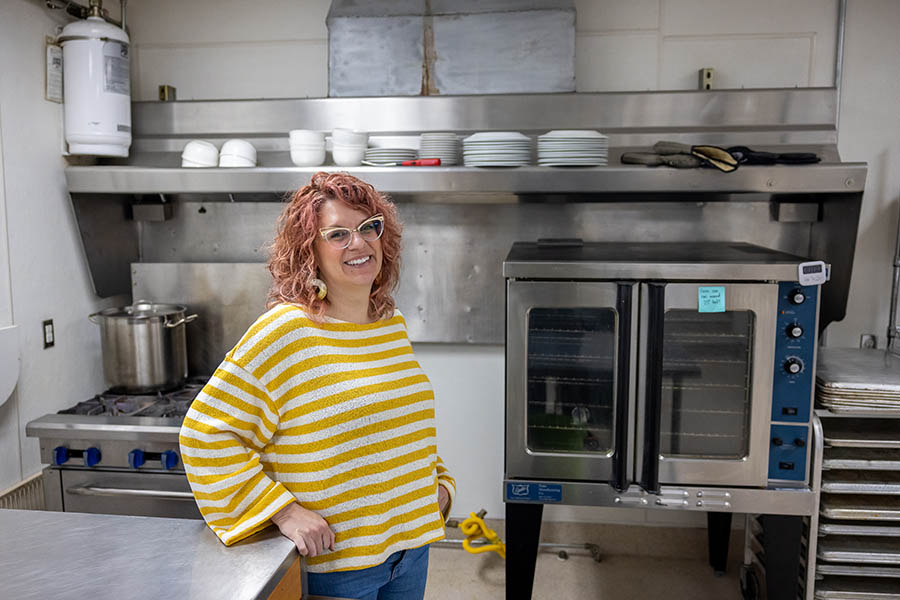
Maidlow’s own nonprofit uses the kitchen to develop recipes and provide nutrition and cooking classes for schoolchildren, while local farms and food producers can lease the space to make value-added products like soups and desserts.
Maidlow says she had the idea for a communal kitchen after repeated talks with local farmers her organization worked with. When the CCD reached out to her about participating in the ERI program, it was the opportunity she had been waiting for. In addition to helping her secure a $25,000 grant for the acquisition of the space and for purchasing equipment, members of the CCD took her on tours of other commercial kitchens and conducted market research to see what features her commercial kitchen would need in order to offer the most value to her organization as well as the potential renters she intended to serve.
“There’s no way I could have done the kitchen without them,” says Maidlow, who says if she had followed her original plan of partnering with Umpqua Community College for the shared kitchen space, the commercial kitchen project could have become a financial nightmare.
“They helped find the perfect space that was small enough and that could make a profit. If I had gone to UCC, we would not have made any money. Kim kept telling me, ‘Don’t worry about it being too small, we want you to grow. If and when it gets too small, we’ll find you a new place,’ which was huge. It was just great to have an extra set of eyes working on the project and people who had more connections in the community to find what fit us the best.”
After opening for business in February of this year, the commercial kitchen now leases more than 100 hours a month to local businesses.
Cindy Moore, vice president of the OEDA board of directors — and judge for the 2022 Awards of Excellence, which presented the CCD with its Outstanding Collaborative Partnership Award — says the key to the ERI program’s success, and the reason it stood out to the selection committee, was its engagement with the business owners and nonprofit leaders it served.
“It was just a super-collaborative approach, which is so Oregon,” says Moore. “The participation and the collaboration of businesses, local governments, nonprofits and other stakeholders was a key takeaway for us. This wasn’t just a quasi-governmental agency or local jurisdiction pulling this together; this was truly a collaboration, a public-private partnership. It wasn’t just one entity saying, ‘Here’s all the things that we’ve done.’ It was ‘Here are all the things, collectively, that this group has done.’”
Moore says other counties could learn a lot from the ERI’s collaborative approach to working with businesses and nonprofits to increase economic resiliency in the face of disaster.
“It was just such a difficult time for so many of us during that period. There was so much uncertainty and change, and everything looked different. Yes, resiliency has to do with operations and budgets, but it also has to do with the human side of things. Resiliency of a community is knowing you have each other’s backs, in the sense that they’re not in it alone,” says Moore.
“At the end of the day, there is somebody who signed the title approvals, and it was amazing how much the [ERI] was able to distribute, but I think if I were to talk to any other communities, I would say the approach of bringing diverse partners together achieved a much better outcome instead of one organization feeling like they know what is best.”
For Georgie Pulman-Olzaski, K9 Crack is just getting started. In June of 2022, K9 Crack was the grand-prize winner of the Umpqua GrowthTalks Small Business Pitch Night, securing $15,000 in prize money. This year she invested $12,000 in new packaging for her products and is working with five Oregon slaughterhouses to ensure her company’s growing needs can be met through a local supply chain.
Under the CCD’s mentorship, K9 Crack grew its gross income by 85% in 2021, and 40% in 2022. Pulman-Olzaski’s goal now is to expand along the I-5 corridor and online. She says the CCD continues to work with her in getting her product into the Made in Oregon store and into higher-end retail stores across the state.
She says the ERI program was instrumental in the success and growth of her brand, and that she owes a considerable portion of her success to their guidance, expertise and, most of all, their hard work and dedication to making sure her business grew to become the best version of itself.
“It’s like always having somebody at your back,” says Pulman-Olzaski. “When you work on your own, sometimes you’re just like, ‘Why the hell am I doing this?’ and hit your head against a brick wall like you’re going crazy. And they’re there patting me on the back and just saying, ‘Listen, it’s okay, everyone feels like this. Let’s show you how far you’ve come and maximize all the resources that we have available.’ That’s really good. I can’t say enough good things about them.”
Click here to subscribe to Oregon Business.






